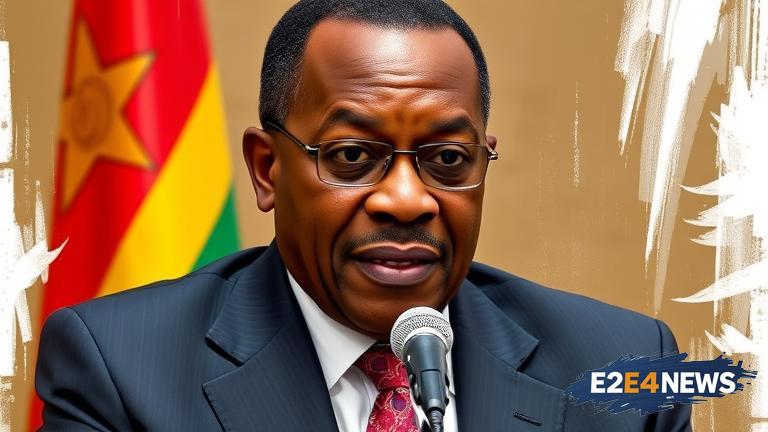In a recent development, Zimbabwean Vice President Kembo Mohadi has taken on the role of acting president, a move that has garnered significant attention and sparked intense debate about the country’s political future. This transition of power has been met with a mix of reactions, ranging from optimism to skepticism, as the nation navigates its complex political terrain. The assumption of the acting presidency by Mohadi is seen by some as a strategic move, potentially paving the way for a new era in Zimbabwean politics. Others, however, view this development with caution, citing concerns about the implications for the country’s stability and governance. As the acting president, Mohadi is expected to oversee the implementation of key policies and decisions, which could have far-reaching consequences for the nation. The Zimbabwean government has been working to address various challenges, including economic difficulties and social unrest, and Mohadi’s leadership will be closely watched as he navigates these issues. The international community is also observing the situation closely, with many nations and organizations expressing interest in the developments unfolding in Zimbabwe. Despite the challenges, there is a sense of hope among some Zimbabweans that this new chapter could bring about positive change and progress. However, others are more reserved, pointing to the need for comprehensive reforms and a more inclusive political process. The role of the opposition and civil society in shaping the country’s future will also be crucial, as they continue to advocate for transparency, accountability, and human rights. Meanwhile, the regional and global implications of this development should not be underestimated, as Zimbabwe’s relationships with neighboring countries and international partners could be impacted. The Southern African Development Community (SADC) and the African Union (AU) are among the organizations that may be closely monitoring the situation, given their interests in regional stability and cooperation. As the situation continues to unfold, it is clear that the coming weeks and months will be critical in determining the trajectory of Zimbabwe’s political and economic development. The ability of the acting president and the government to respond to the needs and aspirations of the Zimbabwean people will be a key factor in shaping the country’s future. Furthermore, the international community’s response, including the provision of support and assistance, could play a significant role in helping Zimbabwe address its challenges and achieve its development goals. In conclusion, the assumption of the acting presidency by Kembo Mohadi marks an important turning point in Zimbabwe’s history, with significant implications for the country’s political, economic, and social landscape. As the nation moves forward, it is essential that all stakeholders work together to promote stability, inclusivity, and prosperity for all Zimbabweans. The road ahead will undoubtedly be challenging, but with determination, cooperation, and a commitment to the well-being of the people, Zimbabwe can overcome its obstacles and build a brighter future. The world watches with interest as this African nation navigates its complexities, seeking to emerge stronger and more resilient. With its rich history, diverse culture, and resilient people, Zimbabwe has the potential to become a beacon of hope and stability in the region. Only time will tell how the current developments will shape the country’s destiny, but one thing is certain – the journey ahead will be filled with opportunities and challenges that will require careful navigation and strategic decision-making. The people of Zimbabwe, along with the international community, await the next steps with bated breath, hoping for a positive outcome that will benefit the nation and its citizens. The situation is complex, and the path forward is uncertain, but with a collective effort, Zimbabwe can rise to the challenges and create a better future for all. The country’s natural resources, human capital, and strategic location make it an important player in the region, and its success will have far-reaching implications for the entire continent. As the acting president, Mohadi has a unique opportunity to make a lasting impact on the country’s development, and his leadership will be closely watched by Zimbabweans and the international community alike. The coming months will be crucial in determining the success of his tenure and the future of the nation. In the end, the success of Zimbabwe will depend on the ability of its leaders to work together, to put the interests of the people first, and to create a conducive environment for growth, development, and prosperity. The world is watching, and the people of Zimbabwe are waiting with anticipation, hoping for a brighter future that will bring peace, stability, and prosperity to their nation.
